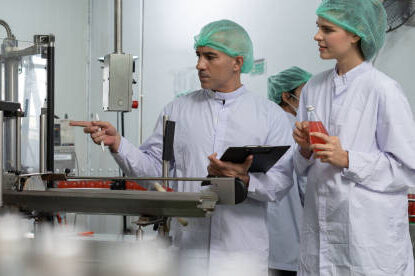How to Get a Food Processing License in NYC Today
Starting a food processing business in New York City is an exciting venture, but it requires navigating regulatory steps to...

Starting a food processing business in New York City is an exciting venture, but it requires navigating regulatory steps to ensure compliance with state and local laws. One of the most critical requirements is obtaining a food processing license NYC, issued by the New York State Department of Agriculture and Markets. This license ensures that your business adheres to strict safety and sanitation standards, protecting public health and establishing credibility. Below is a comprehensive guide to securing your food processing license in NYC as of today, 22 April 2025.
Understanding the Food Processing License
The food processing license NYC, formally known as the Article 20-C Food Processing Establishment License, is required for businesses preparing, processing, or packaging food for off-premises consumption. This includes cooking, baking, freezing, drying, or repackaging foods such as meats, cheeses, sushi, sandwiches, or ready-to-eat meals. Retail food stores, wholesale bakeries, and processing plants that engage in these activities must obtain this license. However, businesses like restaurants or cafes that serve food directly to consumers for on-site consumption typically need a Food Service Establishment Permit instead, issued by the NYC Department of Health and Mental Hygiene.
Step-by-Step Guide to Obtaining Your Food Processing License NYC
1. Determine If You Need the License
Before applying, confirm that your business requires an Article 20-C food processing license in NYC. This license applies to:
- Food manufacturers, processing plants, or wholesale bakeries.
- Retail food stores conduct food preparation, such as slicing meats or cheeses, heating foods, or preparing sushi.
- Shared kitchens or commissaries processing food for off-site consumption.
Suppose your business only sells pre-packaged, non-hazardous foods (e.g., sealed snacks) or operates as a restaurant. In that case, you may need a different permit, such as a Retail Food Store License or Food Service Establishment Permit. Use the NYC Business Portal’s Step-by-Step tool to clarify your requirements.
2. Prepare Your Facility
Your food processing facility must meet stringent health and sanitation standards. Key requirements include:
- Sanitary Environment: Ensure clean workspaces, proper food handling, and pest control measures.
- Equipment and Layout: Provide adequate facilities, including sinks, restrooms, and storage areas, to maintain cleanliness and prevent food adulteration.
- Waste Disposal: Have a plan for waste management and sanitation procedures.
Submit a detailed floor plan with your application, showing equipment placement, sanitation facilities, and waste storage areas. The kitchen operator must hold a valid Article 20-C license if you’re using a shared kitchen.
3. Complete Food Safety Education
Retail food stores applying for a food processing license NYC must have at least one manager or supervisor who has completed an approved food safety education program, as New York State law mandates. The NYC Health Department offers a free Online Food Protection Course, which includes 15 lessons and a final exam. This certification ensures compliance with food safety practices and must be on-site during operations.
4. Gather Required Documentation
To apply for your food processing license NYC, prepare the following:
- Application Form: Download the appropriate form from the New York State Department of Agriculture and Markets website or the NYS License Center.
- Business Details: Include information about your business, owner, location, and type of food processing activities.
- Product List: Provide a detailed list of food products, including ingredients and processing methods.
- Sanitation Procedures: Document your cleaning and sanitizing protocols.
- Floor Plan: Submit a layout of your facility, as mentioned earlier.
- Food Safety Certification: Include proof of completion for the required food safety course (for retail food stores).
Include a recent water potability test if your facility uses a private water system.
5. Submit Your Application
You can apply for the food processing license NYC online through the NYS License Center or by mail to the New York State Department of Agriculture and Markets, Division of Food Safety and Inspection, 10B Airline Drive, Albany, NY 12235. The application fee varies:
- Standard Fee: $400 for a two-year license.
- Small-Scale Processor: $175 per facility.
- Chain Stores: Fees range from $100 to $900, depending on license duration and regulatory oversight needs.
- First-Time Applicants: The Fee may be waived for two years if processed in a kitchen incubator facility.
Ensure all documentation is complete to avoid delays. You can reapply if your application is rejected by resubmitting the form and Fee.
6. Pass the Facility Inspection
After submitting your application, a Department of Agriculture and Markets specialist will inspect your facility. They will evaluate:
- Food handling and storage practices.
- Sanitation and pest control measures.
- Compliance with state health regulations.
Your food processing license NYC will be issued if your facility meets all standards. You must address deficiencies and schedule a follow-up inspection if they are found.
7. Renew Your License
NYC’s food processing license is valid for two years and must be renewed before expiration to avoid operational disruptions. Renewal involves verifying compliance with continued sanitation and safety standards and paying the applicable Fee. Stay proactive by submitting renewal requests early.
Additional Considerations
Home-Based Food Processing
If you plan to process non-hazardous foods (e.g., baked goods, jams, or dried spices) in your home kitchen, you may qualify for a Home Processor Exemption, which exempts you from the Article 20-C food processing license NYC. However, you must:
- Register with the Department of Agriculture and Markets.
- Sell only within New York State at venues like farmers’ markets or via delivery.
- Use non-commercial equipment and follow strict labelling requirements.
- Submit water test results if using a private water system.
Home-processed foods requiring refrigeration or containing meat are not eligible for this exemption and need a full license.
NYC-Specific Permits
In addition to the state-issued food processing license NYC, you may need a Non-Retail Food Processing Establishment Permit from the NYC Department of Health and Mental Hygiene if your business operates as a shared kitchen, commissary, or wholesale food establishment. This permit costs $280 annually, plus $25 if manufacturing frozen desserts. Contact 311 for assistance with this permit.
Insurance and Zoning
While not required by the Department of Agriculture and Markets, consider obtaining general commercial liability insurance to cover risks like foodborne illnesses. Check with local zoning authorities to ensure your facility complies with building codes and operational limits, especially for home-based or shared kitchen businesses.
Tips for Success
- Start Early: The licensing process, including inspections, can take several months. Begin at least 3-6 months before your planned opening.
- Consult Experts: Work with a legal advisor or services like Tax King to streamline the application process.
- Stay Compliant: Regularly review the Department’s Retail Food Store Sanitation Code and Guidelines for Manufactured Foods to maintain compliance.
- Use Resources: The Department of Agriculture and Markets provides guidance and support. Contact them at (518) 457-5380 or via their website for assistance.
Conclusion
Securing a food processing license NYC is vital for any food processing business in New York City. By understanding the requirements, preparing your facility, and following the application process diligently, you can obtain your license and operate legally while building consumer trust. Whether launching a small-scale operation or a large processing plant, compliance with state regulations ensures your business thrives in NYC’s vibrant food industry. For the latest information and application forms, visit the New York State Department of Agriculture and Markets website or contact the Division of Food Safety and Inspection.



